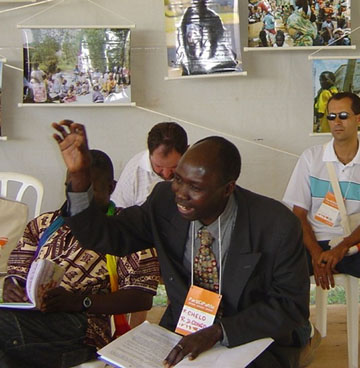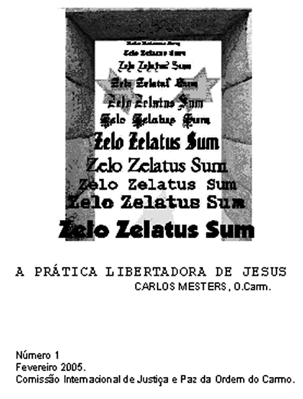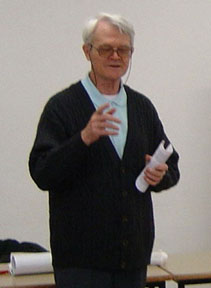CITOC Prophetic Solidarity The news each day is not good. It brings us wars and destruction that is in the interest of the world’s powerful. They present the violence of the wars as just and peace as the submission to ideological agreements. The facts never make the news. They do not receive space on the television news nor will you find them in the newspaper headlines. But the facts affect the deaths of thousands and thousands of persons (babies, women and men victims) from an unbelievable poverty, fruit of political, economic and ideological violence, a warlike or terrorist violence. It is a violence that is indifferent to the poverty and almost always affecting the little people of color, the "non whites." The assistance they merit from the world’s great powers is due to the economic benefits and the exploitation of the natural resources as well as the fear of a revolt by the poor people. It is a help that always points to the need to protect the rich countries. In fact, the assistance is always insufficient, as all of the economic, social, and human indicators show.
In the inaugural homily of his pontificate, Benedict XVI presented an important reflection on how God placed primary importance on the salvation of the poor and the oppressed. God does not use the instruments of the powerful. Christ did not surrender in the face of the bewilderment of a humanity wounded by the violence of sin. "He cannot abandon humanity in such a miserable condition. He jumps to his feet, abandons the glory of heaven, in order to find that sinner and pursues him, until the cross. The burden he bears, carrying our humanity, carrying us. He is the good shepherd, who offers his life for the sins ... The pastor of all men, the Living God, has become the Lamb, he put himself of the lambs, of those who are trampled down and killed. It is through this that he reveals himself as the true pastor: ‘I am the good shepherd ... I offer my life for the sheep" says Jesus about himself. (Jn 10:14ff). It is not power which redeems but love! This is the sign of God: God is love. How many times have we wished the God would show Himself stronger—that He would strike hard, that he would defeat the evil and create a better world. All of the idealogies of power are justified. They justify the destruction of that which would set themselves up for the progress and liberation of humanity. We suffer because of the patience of God. Nevertheless we all have need of His patience. The God, who becomes the sacrificial lamb, is said to come to save the world from the crucifixion and not from the crucifiers. The world is redeemed by the patience of God and destroyed by the impatience of humankind. The Lord made the Carmelite charism a masterpiece for His Church. Many people on various occasions have testified to the power of this charism as a work of justice and peace. The efficacy of the contemplative charism of the Carmelite Order that made men and women search for God who shows Himself to be in solidarity with the poor (cfr "The God of Our Contemplation") is also a response for our time. We Carmelites, men and women, consecrated and lay, are all the carriers of the charism today. We are the prophetic clay that the Holy Spirit models. It is enough to have the courage to let ourselves change. The collaboration with the countries and the poor peoples demands a solidarity based on justice and respect to the human dignity of the poor and their own culture. We who make up the great Family of Carmel and are present on every continent must give special attention to this. It is our religious consecration into poverty and our preferential option for the poor that demands an active solidarity of us, one founded on the principles of biblical justice and peace and on the social teaching of the Church. Carmelites Present at the World Social Forum Eight Carmelites were present at the 2005 World Social Forum in Porto Alegre, Brazil. The Social Forum in its global edition, as well as its regional and thematic gatherings is already a social movement with initiatives including the research of peace through demilitarization, sustainable development, the respect of human rights, diverse cultures and thoughts. It also promotes inter-religious dialogue and the sharing of one’s own spirituality. The presence of diverse groups and religious families at the Forum is continuing to increase. This demonstrates the harmony between the goals of the Social Forum and the perspectives and initiatives of the Catholic groups.
The presentation "The More Children Are Loved, the Fewer Child Soldiers" was made by a group of Carmelites at the 2005 World Social Forum in Porto Alegre, Brazil, under the inscription of the International Commission of Justice and Peace and with the support of the General Curia. The presentation was made in the area of peace and demilitarization. Antonio Silvio da Costa Junior, Chelo Dhebbi, and Dundji Bagave Maknova presented on the problems of the child soldiers in the Democratic Republic of the Congo and the solutions presented by the Carmelite community which is to welcome and to integrate the children by giving particular attention to education and solidarity. The children involved in wars and used as soldiers signal the cruelty of globalization. Its economic and political interests are indifferent to and not capable of dealing with these larger problems. The logic of globalization conducted by economic interests promotes social exclusion and the lives of the poor suffer the worst consequences. Indifference about the deaths of poor people is the extreme form of social exclusion which in this case strikes at the poor children and their parents. The case of the Democratic Republic of the Congo and the solution proposed by the Carmelites as well as other groups working in Justice and Peace, is a paradigm for the study of the phenomenon of the child soldiers in many other parts of the world. The presentation was followed with great interest and resulted in the proposal to let the Africans speak of Africa in an international forum. Next Meeting of the International Commission of Justice and Peace The next meeting of the International Justice and Peace Commission will take place in Curitiba, Brazil at Monte Carmelo monastery. This monastery hosts an unusual Carmelite community made up of brothers and laity who are working for the recovery of people with chemical dependency and their re-entry into society. Building on the experience of last year’s meeting in the Congo, the members decided to meet in Brazil in order to meet the Carmelite Family in concrete situations of Justice and Peace ministry. In August 2005, at Curitiba, the members of the Commission want to reflect on the Rule and Carmelite spirituality at the service of Justice and Peace and social inclusion. The first three days will be spent meeting the community of Monte Carmelo, the Carmelites and the lay groups who, inspired by the Rule and by Carmelite spirituality, take on concrete justice and peace works.
The first number "A Pratica Libertadora de Jesus" (The Liberating Practice of Jesus) of the new collection Zelo Zelatus has been published in Portuguese. It was written by Carlos Mesters. Anyone wanting a copy is asked to contact the Secretary of the International Justice and Peace Commission of the Order: Fr. Antonio Silvio da Costa Junior, Via Giovanni Lanza, 138; 00184, Roma, Italia. E-mail: cijpoc@ocarm.org A reflection on the book can be found in the Res Carmelitana section of this issue of CITOC. The collection was proposed as a way of promoting reflection on Justice and Peace as part of our Carmelite charism and spirituality. The publications are made in the original language of the author and may be freely translated, published and used by justice and peace groups. We ask only that the source be cited and that a printed and a digital copy are sent to the secretary of the International Justice and Peace Commission. The translations and the proposed uses of the texts are available on the Justice and Peace webpage of the Order (www.ocarm.org). Other booklets will be published soon on the themes of the mendicant orders, women, and spirituality.
Various other meetings around the world show that the provinces as well as groups of Carmelites are working on Justice and Peace. Allow us to mention three groups: 1) The Carmelite Family of Northeast Brazil with its work in Carmelo Solidariedade, brothers, sisters, Carmelite lay women and men coming together regularly to study the reality of the situations and the possible responses to the challenges of poverty and injustice; 2) the meeting of the Carmelite Family in Indonesia to organize an NGO that will be able to give strong witness to the evangelical imperative of Justice and Peace, 3) the Carmelite nuns of Carpineto Romano, after a reflection of the community, have decided to engage themselves in moments of community prayer for the justice and peace work of the Carmelite Family. The public prayer of the monastery will be a call to the faithful to engage themselves in justice and peace with an emphasis on tolerance and the welcoming of migrants, especially those of other denominations and faiths; 4) The Italian Province which promoted a day of reflection for the Carmelite Family in order to study the theme of Justice and Peace. This meeting was held at Sassone, outside Rome, with the presence of Antonio Silvio and Carlos Mesters. |
|
|
RETURN TO THE INDEX FOR 2005 | RETURN TO THE INDEX FOR THIS ISSUE INDEX OF CARMELITE
WEBSITES |
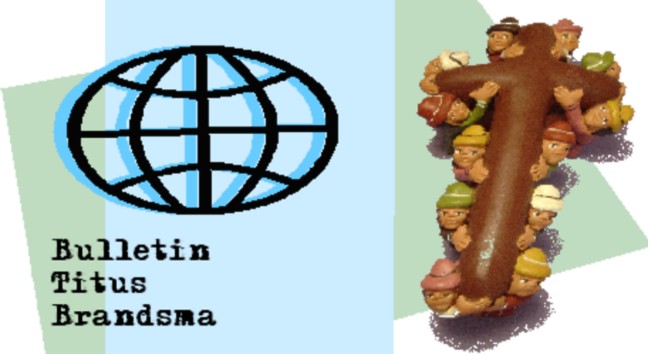
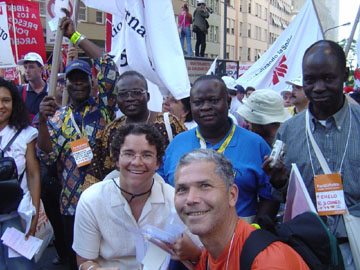 In the Bible, God shows Himself as defender of the poor, of orphans, of
the widows, and of the foreigners. The prophets are His voice and the
actions of the just men and women are the actions of God in the midst of
the people. But the most impressive work of God is the Son of God, who
spends His life doing all good things.
In the Bible, God shows Himself as defender of the poor, of orphans, of
the widows, and of the foreigners. The prophets are His voice and the
actions of the just men and women are the actions of God in the midst of
the people. But the most impressive work of God is the Son of God, who
spends His life doing all good things.